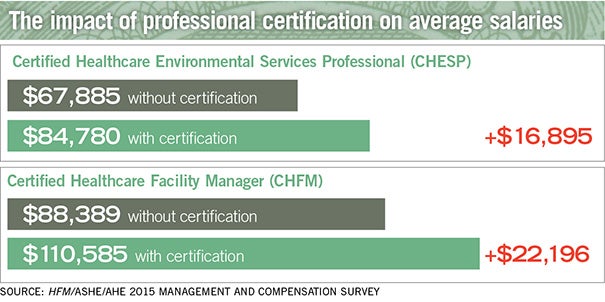2015 Salary Survey results - Page 3

Graying of management
A critical factor destined to leave a huge impact on salaries is the aging of the health care management workforce. The survey shows that 29 percent of respondents have 25 or more years in management/supervision, vs. 26 percent in 2012, while 34 percent have more than 25 years just in health care management, vs. 29 percent in 2012.
One reason for the surge is fewer retirements. Managers are working longer to compensate for factors including retirement portfolio losses suffered during the recession or to finish projects taken on during the surge of recent mergers. But when baby boomers begin retiring en masse, the industry will suffer “a huge talent drain,” Woodin says. “There’s a huge graying of management, and it’s a major problem.” While the survey shows that 73 percent are not planning to retire in the next three years, when that big wave comes, it could hit facility management hard.
Costello agrees this trend will hit environmental services hard as well. “AHE’s goal is to ensure these managers are replaced with competent, highly skilled, strategically focused professionals,” she says.
For that reason, succession planning — essentially grooming talented people within and outside the facility to fill key vacancies — is critical to a hospital’s planning process, Woodin says. While it has yet to take widespread hold, the survey shows that 28 percent have a succession plan in place and 28 percent have a plan in development.
A key part of the plan is recruiting younger employees, who are in short supply in the health facilities management/environmental services fields. The survey shows that just 5.2 percent of survey respondents are between 25 and 34 years.
“Retirements are already leaving huge gaps and there is no one to fill them,” Davis says. “I know one area hospital that was looking for a facility manager for over a year.”
After seeing the challenges firsthand, Gosselin recommends that hospitals target younger candidates from parallel industries, such as pharmaceutical manufacturing, to ensure a compatible background and transferrable skills. “Decades ago, an engineering degree was necessary, but now a business degree would be appropriate considering that real estate and property management as well as fiscal performance are a big part of the job these days. And you really need the hospital experience.”
Certification drives health facility salary increases
While professional certification isn’t yet required for most health care management positions, that’s the direction things are headed. And many managers who are certified are already seeing a difference in their paychecks.
Salaries showed a sizable increase for managers who have earned Certified Healthcare Facility Manager (CHFM) or Certified Healthcare Environmental Services Professional (CHESP) designations, according to the recent survey on management compensation conducted by Health Facilities Management, the American Society for Healthcare Engineering (ASHE) and the Association for the Healthcare Environment (AHE).
Facilities managers each year earn an average of $110,585 with a CHFM, and $88,389 without it; ES/housekeeping managers earn $84,780 with a CHESP, and $67,885 annually without it.
While certification isn’t often required for new hires (8.7 percent require a CHFM, 2.6 percent require a Certified Healthcare Constructor, or CHC, certification and 3.4 percent require a CHESP), Dale Woodin, senior executive director, ASHE, says those requirements will expand soon. “You need to have a certified facility manager heading up your operations,” he says. “Certification used to be a pinnacle; now it’s the point of entry.”
Regardless, roughly half of the respondents surveyed reported having no certification, while 25 percent hold CHFM, 8.5 percent have attained CHESP and 4.5 percent hold CHC certificates.
“Those numbers tell me that we as a profession have a lot of work to do in demonstrating the value of those credentials,” says Patti Costello, executive director, AHE. “But I believe those percentages will go up very soon. A lot more employers either prefer or require certification as the price of admission.”
AHE recently announced a new certification curriculum for environmental services technicians, Certified Healthcare Environmental Services Technician (CHEST), that hospitals and other health care facilities can use to train their technicians. “Offering front-line technicians CHEST certification should drive CHESP certification numbers as well,” Costello says.
Anyway you view it, certification can only help a manager’s career, says Doug Rothermel, CHESP, director of environmental services at St. Joseph’s Hospital, Tampa, Fla.
“In my organization, certification sets you apart as someone who goes the extra mile, someone who is a go-getter,” Rothermel says. “When it’s clear that certification is tied to higher salaries, why not pursue it? It’s a win-win.”





